Report on Crown Resorts Code of Ethics: Key Ethical Issues
VerifiedAdded on 2022/09/05
|6
|2445
|21
Report
AI Summary
This report provides a comprehensive analysis of the Code of Ethics for Crown Resorts, one of Australia's largest entertainment groups. It examines key ethical issues including discrimination, exploitation, corruption, dishonest and fraudulent behavior, and whistleblower protections. The report defines each issue, provides real-world examples, and outlines the rules and regulations that Crown Resorts should implement to address these concerns. It also details the disciplinary actions and external penalties associated with ethical violations, referencing relevant legislation such as the Age Discrimination Act, Fair Work Act, and Anti-Money Laundering and Counter-Terrorism Financing Act. The report emphasizes the importance of creating a safe and ethical workplace environment and concludes by highlighting the responsibility of each employee to uphold the Code of Ethics and comply with all local laws and customs. The report is well-structured, providing clear definitions, examples, and rules for each ethical issue, making it a valuable resource for understanding the ethical challenges faced by Crown Resorts and the measures required to ensure responsible business practices.
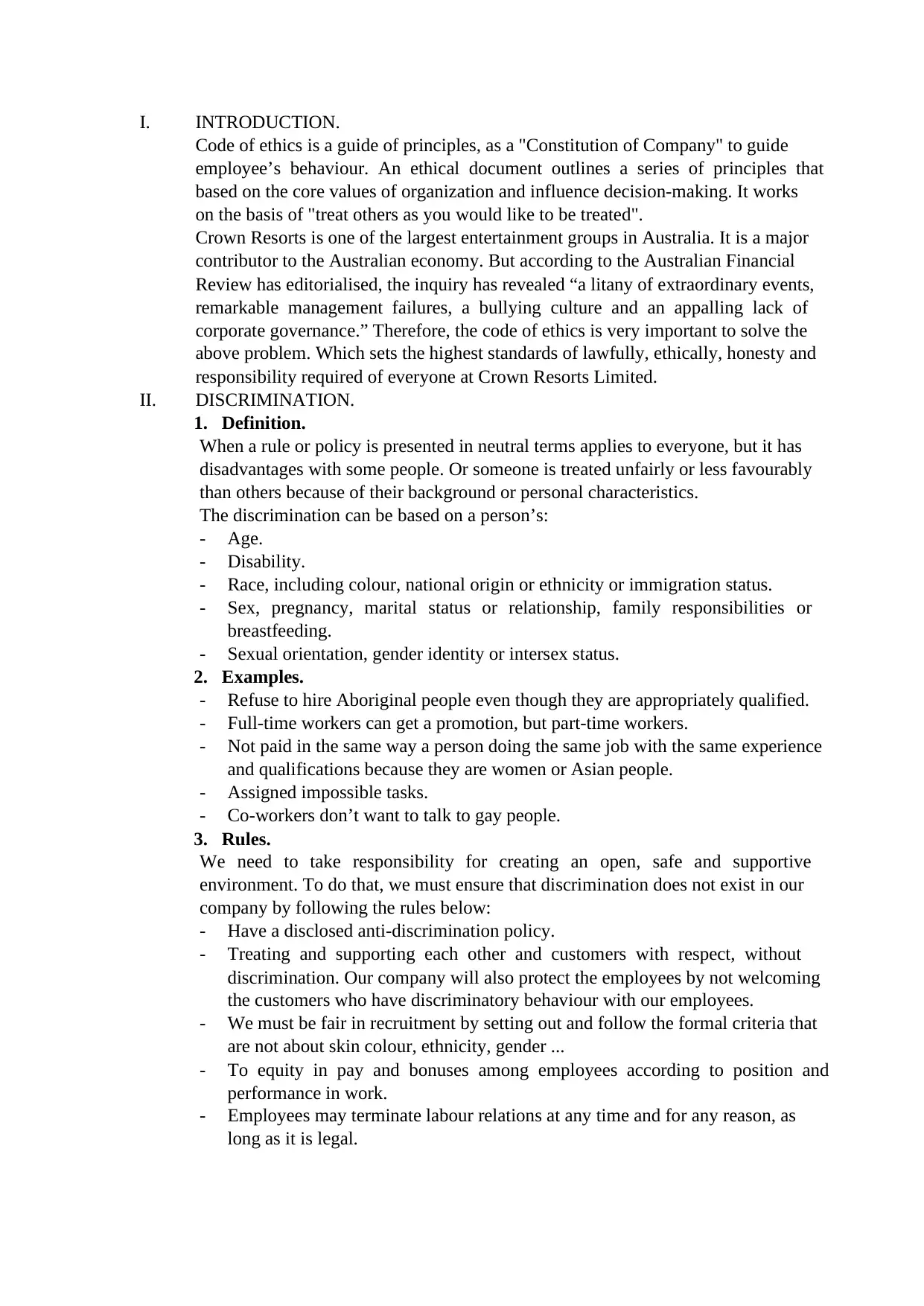
I. INTRODUCTION.
Code of ethics is a guide of principles, as a "Constitution of Company" to guide
employee’s behaviour. An ethical document outlines a series of principles that
based on the core values of organization and influence decision-making. It works
on the basis of "treat others as you would like to be treated".
Crown Resorts is one of the largest entertainment groups in Australia. It is a major
contributor to the Australian economy. But according to the Australian Financial
Review has editorialised, the inquiry has revealed “a litany of extraordinary events,
remarkable management failures, a bullying culture and an appalling lack of
corporate governance.” Therefore, the code of ethics is very important to solve the
above problem. Which sets the highest standards of lawfully, ethically, honesty and
responsibility required of everyone at Crown Resorts Limited.
II. DISCRIMINATION.
1. Definition.
When a rule or policy is presented in neutral terms applies to everyone, but it has
disadvantages with some people. Or someone is treated unfairly or less favourably
than others because of their background or personal characteristics.
The discrimination can be based on a person’s:
- Age.
- Disability.
- Race, including colour, national origin or ethnicity or immigration status.
- Sex, pregnancy, marital status or relationship, family responsibilities or
breastfeeding.
- Sexual orientation, gender identity or intersex status.
2. Examples.
- Refuse to hire Aboriginal people even though they are appropriately qualified.
- Full-time workers can get a promotion, but part-time workers.
- Not paid in the same way a person doing the same job with the same experience
and qualifications because they are women or Asian people.
- Assigned impossible tasks.
- Co-workers don’t want to talk to gay people.
3. Rules.
We need to take responsibility for creating an open, safe and supportive
environment. To do that, we must ensure that discrimination does not exist in our
company by following the rules below:
- Have a disclosed anti-discrimination policy.
- Treating and supporting each other and customers with respect, without
discrimination. Our company will also protect the employees by not welcoming
the customers who have discriminatory behaviour with our employees.
- We must be fair in recruitment by setting out and follow the formal criteria that
are not about skin colour, ethnicity, gender ...
- To equity in pay and bonuses among employees according to position and
performance in work.
- Employees may terminate labour relations at any time and for any reason, as
long as it is legal.
Code of ethics is a guide of principles, as a "Constitution of Company" to guide
employee’s behaviour. An ethical document outlines a series of principles that
based on the core values of organization and influence decision-making. It works
on the basis of "treat others as you would like to be treated".
Crown Resorts is one of the largest entertainment groups in Australia. It is a major
contributor to the Australian economy. But according to the Australian Financial
Review has editorialised, the inquiry has revealed “a litany of extraordinary events,
remarkable management failures, a bullying culture and an appalling lack of
corporate governance.” Therefore, the code of ethics is very important to solve the
above problem. Which sets the highest standards of lawfully, ethically, honesty and
responsibility required of everyone at Crown Resorts Limited.
II. DISCRIMINATION.
1. Definition.
When a rule or policy is presented in neutral terms applies to everyone, but it has
disadvantages with some people. Or someone is treated unfairly or less favourably
than others because of their background or personal characteristics.
The discrimination can be based on a person’s:
- Age.
- Disability.
- Race, including colour, national origin or ethnicity or immigration status.
- Sex, pregnancy, marital status or relationship, family responsibilities or
breastfeeding.
- Sexual orientation, gender identity or intersex status.
2. Examples.
- Refuse to hire Aboriginal people even though they are appropriately qualified.
- Full-time workers can get a promotion, but part-time workers.
- Not paid in the same way a person doing the same job with the same experience
and qualifications because they are women or Asian people.
- Assigned impossible tasks.
- Co-workers don’t want to talk to gay people.
3. Rules.
We need to take responsibility for creating an open, safe and supportive
environment. To do that, we must ensure that discrimination does not exist in our
company by following the rules below:
- Have a disclosed anti-discrimination policy.
- Treating and supporting each other and customers with respect, without
discrimination. Our company will also protect the employees by not welcoming
the customers who have discriminatory behaviour with our employees.
- We must be fair in recruitment by setting out and follow the formal criteria that
are not about skin colour, ethnicity, gender ...
- To equity in pay and bonuses among employees according to position and
performance in work.
- Employees may terminate labour relations at any time and for any reason, as
long as it is legal.
Paraphrase This Document
Need a fresh take? Get an instant paraphrase of this document with our AI Paraphraser
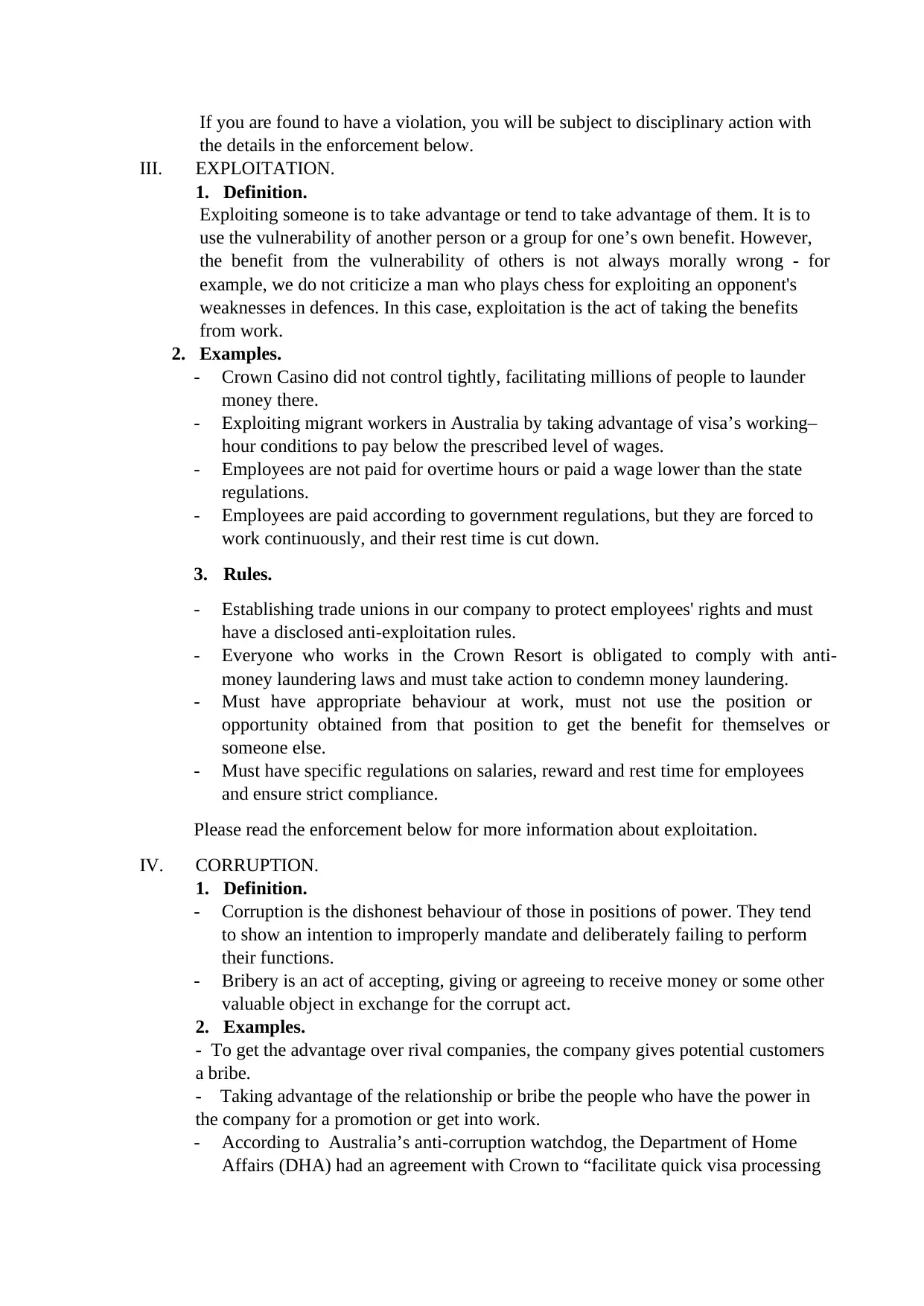
If you are found to have a violation, you will be subject to disciplinary action with
the details in the enforcement below.
III. EXPLOITATION.
1. Definition.
Exploiting someone is to take advantage or tend to take advantage of them. It is to
use the vulnerability of another person or a group for one’s own benefit. However,
the benefit from the vulnerability of others is not always morally wrong - for
example, we do not criticize a man who plays chess for exploiting an opponent's
weaknesses in defences. In this case, exploitation is the act of taking the benefits
from work.
2. Examples.
- Crown Casino did not control tightly, facilitating millions of people to launder
money there.
- Exploiting migrant workers in Australia by taking advantage of visa’s working–
hour conditions to pay below the prescribed level of wages.
- Employees are not paid for overtime hours or paid a wage lower than the state
regulations.
- Employees are paid according to government regulations, but they are forced to
work continuously, and their rest time is cut down.
3. Rules.
- Establishing trade unions in our company to protect employees' rights and must
have a disclosed anti-exploitation rules.
- Everyone who works in the Crown Resort is obligated to comply with anti-
money laundering laws and must take action to condemn money laundering.
- Must have appropriate behaviour at work, must not use the position or
opportunity obtained from that position to get the benefit for themselves or
someone else.
- Must have specific regulations on salaries, reward and rest time for employees
and ensure strict compliance.
Please read the enforcement below for more information about exploitation.
IV. CORRUPTION.
1. Definition.
- Corruption is the dishonest behaviour of those in positions of power. They tend
to show an intention to improperly mandate and deliberately failing to perform
their functions.
- Bribery is an act of accepting, giving or agreeing to receive money or some other
valuable object in exchange for the corrupt act.
2. Examples.
- To get the advantage over rival companies, the company gives potential customers
a bribe.
- Taking advantage of the relationship or bribe the people who have the power in
the company for a promotion or get into work.
- According to Australia’s anti-corruption watchdog, the Department of Home
Affairs (DHA) had an agreement with Crown to “facilitate quick visa processing
the details in the enforcement below.
III. EXPLOITATION.
1. Definition.
Exploiting someone is to take advantage or tend to take advantage of them. It is to
use the vulnerability of another person or a group for one’s own benefit. However,
the benefit from the vulnerability of others is not always morally wrong - for
example, we do not criticize a man who plays chess for exploiting an opponent's
weaknesses in defences. In this case, exploitation is the act of taking the benefits
from work.
2. Examples.
- Crown Casino did not control tightly, facilitating millions of people to launder
money there.
- Exploiting migrant workers in Australia by taking advantage of visa’s working–
hour conditions to pay below the prescribed level of wages.
- Employees are not paid for overtime hours or paid a wage lower than the state
regulations.
- Employees are paid according to government regulations, but they are forced to
work continuously, and their rest time is cut down.
3. Rules.
- Establishing trade unions in our company to protect employees' rights and must
have a disclosed anti-exploitation rules.
- Everyone who works in the Crown Resort is obligated to comply with anti-
money laundering laws and must take action to condemn money laundering.
- Must have appropriate behaviour at work, must not use the position or
opportunity obtained from that position to get the benefit for themselves or
someone else.
- Must have specific regulations on salaries, reward and rest time for employees
and ensure strict compliance.
Please read the enforcement below for more information about exploitation.
IV. CORRUPTION.
1. Definition.
- Corruption is the dishonest behaviour of those in positions of power. They tend
to show an intention to improperly mandate and deliberately failing to perform
their functions.
- Bribery is an act of accepting, giving or agreeing to receive money or some other
valuable object in exchange for the corrupt act.
2. Examples.
- To get the advantage over rival companies, the company gives potential customers
a bribe.
- Taking advantage of the relationship or bribe the people who have the power in
the company for a promotion or get into work.
- According to Australia’s anti-corruption watchdog, the Department of Home
Affairs (DHA) had an agreement with Crown to “facilitate quick visa processing
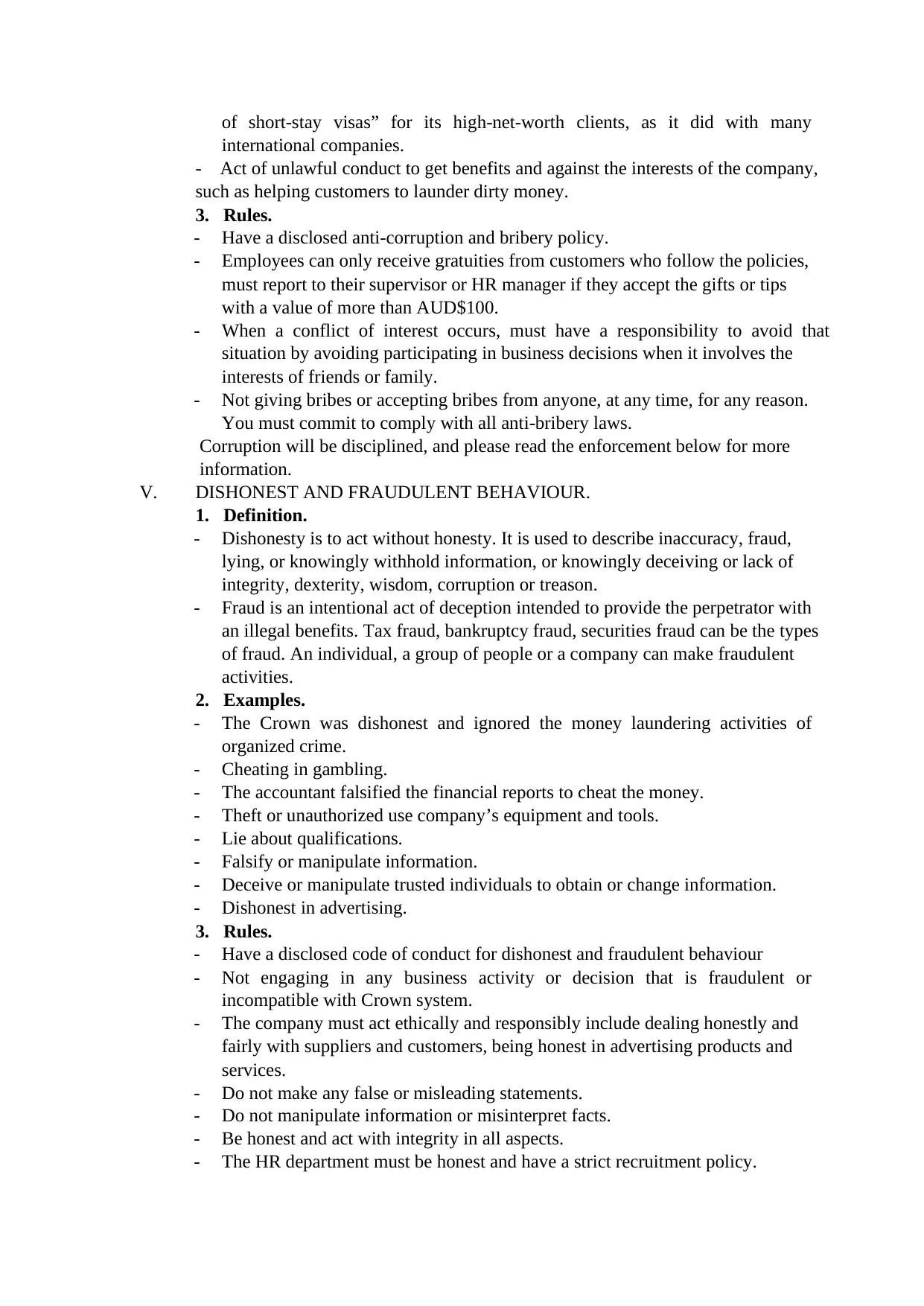
of short-stay visas” for its high-net-worth clients, as it did with many
international companies.
- Act of unlawful conduct to get benefits and against the interests of the company,
such as helping customers to launder dirty money.
3. Rules.
- Have a disclosed anti-corruption and bribery policy.
- Employees can only receive gratuities from customers who follow the policies,
must report to their supervisor or HR manager if they accept the gifts or tips
with a value of more than AUD$100.
- When a conflict of interest occurs, must have a responsibility to avoid that
situation by avoiding participating in business decisions when it involves the
interests of friends or family.
- Not giving bribes or accepting bribes from anyone, at any time, for any reason.
You must commit to comply with all anti-bribery laws.
Corruption will be disciplined, and please read the enforcement below for more
information.
V. DISHONEST AND FRAUDULENT BEHAVIOUR.
1. Definition.
- Dishonesty is to act without honesty. It is used to describe inaccuracy, fraud,
lying, or knowingly withhold information, or knowingly deceiving or lack of
integrity, dexterity, wisdom, corruption or treason.
- Fraud is an intentional act of deception intended to provide the perpetrator with
an illegal benefits. Tax fraud, bankruptcy fraud, securities fraud can be the types
of fraud. An individual, a group of people or a company can make fraudulent
activities.
2. Examples.
- The Crown was dishonest and ignored the money laundering activities of
organized crime.
- Cheating in gambling.
- The accountant falsified the financial reports to cheat the money.
- Theft or unauthorized use company’s equipment and tools.
- Lie about qualifications.
- Falsify or manipulate information.
- Deceive or manipulate trusted individuals to obtain or change information.
- Dishonest in advertising.
3. Rules.
- Have a disclosed code of conduct for dishonest and fraudulent behaviour
- Not engaging in any business activity or decision that is fraudulent or
incompatible with Crown system.
- The company must act ethically and responsibly include dealing honestly and
fairly with suppliers and customers, being honest in advertising products and
services.
- Do not make any false or misleading statements.
- Do not manipulate information or misinterpret facts.
- Be honest and act with integrity in all aspects.
- The HR department must be honest and have a strict recruitment policy.
international companies.
- Act of unlawful conduct to get benefits and against the interests of the company,
such as helping customers to launder dirty money.
3. Rules.
- Have a disclosed anti-corruption and bribery policy.
- Employees can only receive gratuities from customers who follow the policies,
must report to their supervisor or HR manager if they accept the gifts or tips
with a value of more than AUD$100.
- When a conflict of interest occurs, must have a responsibility to avoid that
situation by avoiding participating in business decisions when it involves the
interests of friends or family.
- Not giving bribes or accepting bribes from anyone, at any time, for any reason.
You must commit to comply with all anti-bribery laws.
Corruption will be disciplined, and please read the enforcement below for more
information.
V. DISHONEST AND FRAUDULENT BEHAVIOUR.
1. Definition.
- Dishonesty is to act without honesty. It is used to describe inaccuracy, fraud,
lying, or knowingly withhold information, or knowingly deceiving or lack of
integrity, dexterity, wisdom, corruption or treason.
- Fraud is an intentional act of deception intended to provide the perpetrator with
an illegal benefits. Tax fraud, bankruptcy fraud, securities fraud can be the types
of fraud. An individual, a group of people or a company can make fraudulent
activities.
2. Examples.
- The Crown was dishonest and ignored the money laundering activities of
organized crime.
- Cheating in gambling.
- The accountant falsified the financial reports to cheat the money.
- Theft or unauthorized use company’s equipment and tools.
- Lie about qualifications.
- Falsify or manipulate information.
- Deceive or manipulate trusted individuals to obtain or change information.
- Dishonest in advertising.
3. Rules.
- Have a disclosed code of conduct for dishonest and fraudulent behaviour
- Not engaging in any business activity or decision that is fraudulent or
incompatible with Crown system.
- The company must act ethically and responsibly include dealing honestly and
fairly with suppliers and customers, being honest in advertising products and
services.
- Do not make any false or misleading statements.
- Do not manipulate information or misinterpret facts.
- Be honest and act with integrity in all aspects.
- The HR department must be honest and have a strict recruitment policy.
⊘ This is a preview!⊘
Do you want full access?
Subscribe today to unlock all pages.

Trusted by 1+ million students worldwide
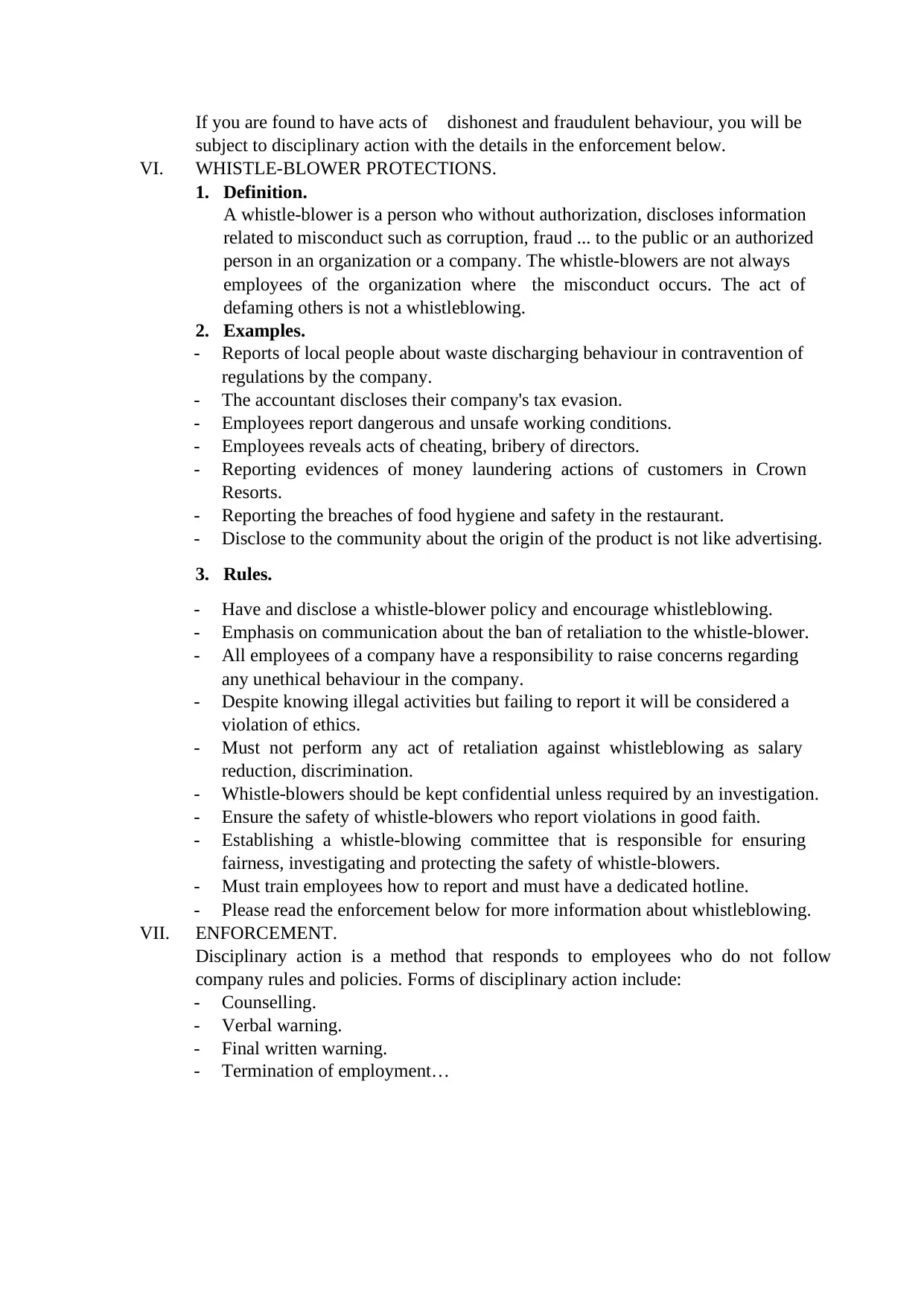
If you are found to have acts of dishonest and fraudulent behaviour, you will be
subject to disciplinary action with the details in the enforcement below.
VI. WHISTLE-BLOWER PROTECTIONS.
1. Definition.
A whistle-blower is a person who without authorization, discloses information
related to misconduct such as corruption, fraud ... to the public or an authorized
person in an organization or a company. The whistle-blowers are not always
employees of the organization where the misconduct occurs. The act of
defaming others is not a whistleblowing.
2. Examples.
- Reports of local people about waste discharging behaviour in contravention of
regulations by the company.
- The accountant discloses their company's tax evasion.
- Employees report dangerous and unsafe working conditions.
- Employees reveals acts of cheating, bribery of directors.
- Reporting evidences of money laundering actions of customers in Crown
Resorts.
- Reporting the breaches of food hygiene and safety in the restaurant.
- Disclose to the community about the origin of the product is not like advertising.
3. Rules.
- Have and disclose a whistle-blower policy and encourage whistleblowing.
- Emphasis on communication about the ban of retaliation to the whistle-blower.
- All employees of a company have a responsibility to raise concerns regarding
any unethical behaviour in the company.
- Despite knowing illegal activities but failing to report it will be considered a
violation of ethics.
- Must not perform any act of retaliation against whistleblowing as salary
reduction, discrimination.
- Whistle-blowers should be kept confidential unless required by an investigation.
- Ensure the safety of whistle-blowers who report violations in good faith.
- Establishing a whistle-blowing committee that is responsible for ensuring
fairness, investigating and protecting the safety of whistle-blowers.
- Must train employees how to report and must have a dedicated hotline.
- Please read the enforcement below for more information about whistleblowing.
VII. ENFORCEMENT.
Disciplinary action is a method that responds to employees who do not follow
company rules and policies. Forms of disciplinary action include:
- Counselling.
- Verbal warning.
- Final written warning.
- Termination of employment…
subject to disciplinary action with the details in the enforcement below.
VI. WHISTLE-BLOWER PROTECTIONS.
1. Definition.
A whistle-blower is a person who without authorization, discloses information
related to misconduct such as corruption, fraud ... to the public or an authorized
person in an organization or a company. The whistle-blowers are not always
employees of the organization where the misconduct occurs. The act of
defaming others is not a whistleblowing.
2. Examples.
- Reports of local people about waste discharging behaviour in contravention of
regulations by the company.
- The accountant discloses their company's tax evasion.
- Employees report dangerous and unsafe working conditions.
- Employees reveals acts of cheating, bribery of directors.
- Reporting evidences of money laundering actions of customers in Crown
Resorts.
- Reporting the breaches of food hygiene and safety in the restaurant.
- Disclose to the community about the origin of the product is not like advertising.
3. Rules.
- Have and disclose a whistle-blower policy and encourage whistleblowing.
- Emphasis on communication about the ban of retaliation to the whistle-blower.
- All employees of a company have a responsibility to raise concerns regarding
any unethical behaviour in the company.
- Despite knowing illegal activities but failing to report it will be considered a
violation of ethics.
- Must not perform any act of retaliation against whistleblowing as salary
reduction, discrimination.
- Whistle-blowers should be kept confidential unless required by an investigation.
- Ensure the safety of whistle-blowers who report violations in good faith.
- Establishing a whistle-blowing committee that is responsible for ensuring
fairness, investigating and protecting the safety of whistle-blowers.
- Must train employees how to report and must have a dedicated hotline.
- Please read the enforcement below for more information about whistleblowing.
VII. ENFORCEMENT.
Disciplinary action is a method that responds to employees who do not follow
company rules and policies. Forms of disciplinary action include:
- Counselling.
- Verbal warning.
- Final written warning.
- Termination of employment…
Paraphrase This Document
Need a fresh take? Get an instant paraphrase of this document with our AI Paraphraser
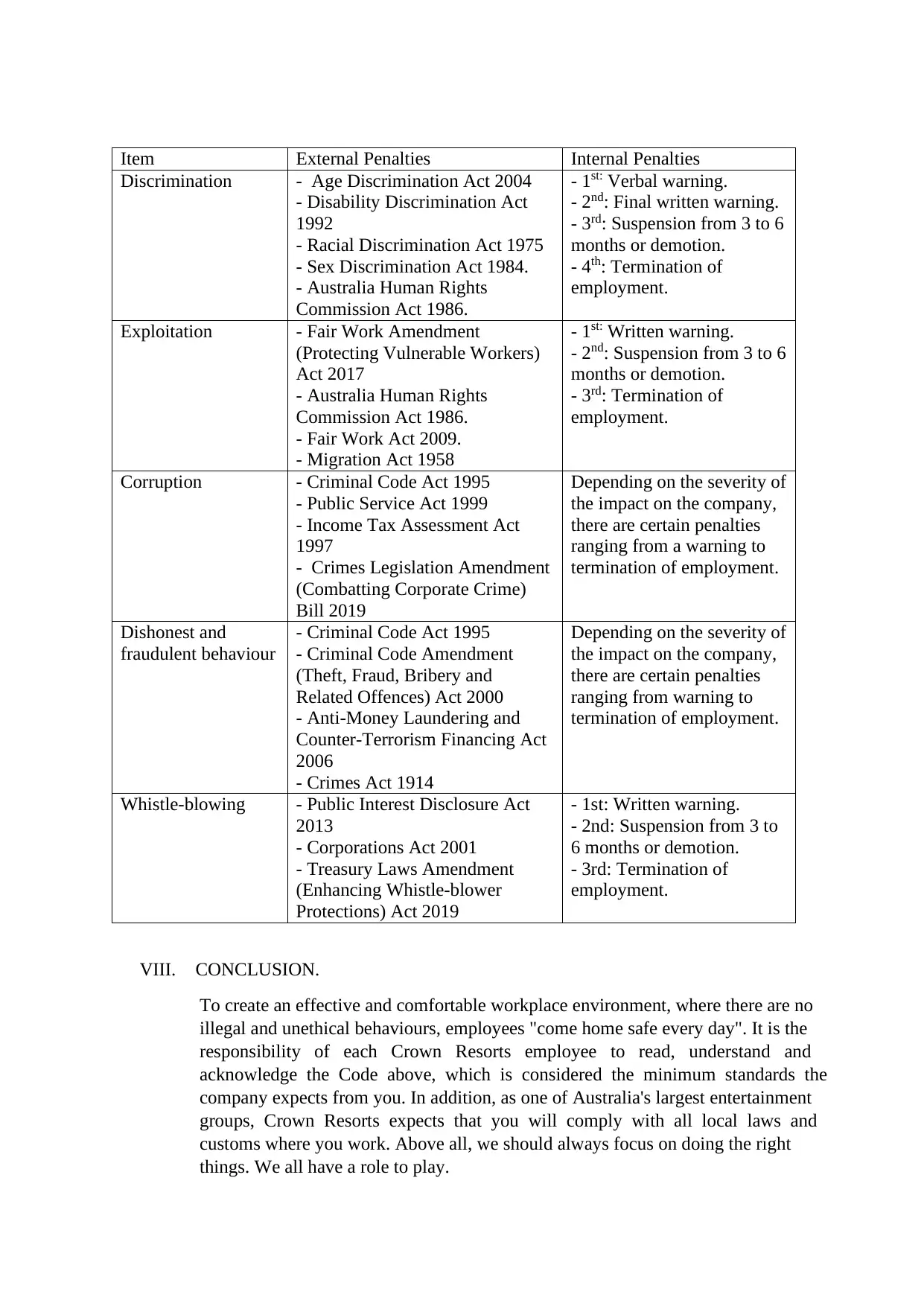
Item External Penalties Internal Penalties
Discrimination - Age Discrimination Act 2004
- Disability Discrimination Act
1992
- Racial Discrimination Act 1975
- Sex Discrimination Act 1984.
- Australia Human Rights
Commission Act 1986.
- 1st: Verbal warning.
- 2nd: Final written warning.
- 3rd: Suspension from 3 to 6
months or demotion.
- 4th: Termination of
employment.
Exploitation - Fair Work Amendment
(Protecting Vulnerable Workers)
Act 2017
- Australia Human Rights
Commission Act 1986.
- Fair Work Act 2009.
- Migration Act 1958
- 1st: Written warning.
- 2nd: Suspension from 3 to 6
months or demotion.
- 3rd: Termination of
employment.
Corruption - Criminal Code Act 1995
- Public Service Act 1999
- Income Tax Assessment Act
1997
- Crimes Legislation Amendment
(Combatting Corporate Crime)
Bill 2019
Depending on the severity of
the impact on the company,
there are certain penalties
ranging from a warning to
termination of employment.
Dishonest and
fraudulent behaviour
- Criminal Code Act 1995
- Criminal Code Amendment
(Theft, Fraud, Bribery and
Related Offences) Act 2000
- Anti-Money Laundering and
Counter-Terrorism Financing Act
2006
- Crimes Act 1914
Depending on the severity of
the impact on the company,
there are certain penalties
ranging from warning to
termination of employment.
Whistle-blowing - Public Interest Disclosure Act
2013
- Corporations Act 2001
- Treasury Laws Amendment
(Enhancing Whistle-blower
Protections) Act 2019
- 1st: Written warning.
- 2nd: Suspension from 3 to
6 months or demotion.
- 3rd: Termination of
employment.
VIII. CONCLUSION.
To create an effective and comfortable workplace environment, where there are no
illegal and unethical behaviours, employees "come home safe every day". It is the
responsibility of each Crown Resorts employee to read, understand and
acknowledge the Code above, which is considered the minimum standards the
company expects from you. In addition, as one of Australia's largest entertainment
groups, Crown Resorts expects that you will comply with all local laws and
customs where you work. Above all, we should always focus on doing the right
things. We all have a role to play.
Discrimination - Age Discrimination Act 2004
- Disability Discrimination Act
1992
- Racial Discrimination Act 1975
- Sex Discrimination Act 1984.
- Australia Human Rights
Commission Act 1986.
- 1st: Verbal warning.
- 2nd: Final written warning.
- 3rd: Suspension from 3 to 6
months or demotion.
- 4th: Termination of
employment.
Exploitation - Fair Work Amendment
(Protecting Vulnerable Workers)
Act 2017
- Australia Human Rights
Commission Act 1986.
- Fair Work Act 2009.
- Migration Act 1958
- 1st: Written warning.
- 2nd: Suspension from 3 to 6
months or demotion.
- 3rd: Termination of
employment.
Corruption - Criminal Code Act 1995
- Public Service Act 1999
- Income Tax Assessment Act
1997
- Crimes Legislation Amendment
(Combatting Corporate Crime)
Bill 2019
Depending on the severity of
the impact on the company,
there are certain penalties
ranging from a warning to
termination of employment.
Dishonest and
fraudulent behaviour
- Criminal Code Act 1995
- Criminal Code Amendment
(Theft, Fraud, Bribery and
Related Offences) Act 2000
- Anti-Money Laundering and
Counter-Terrorism Financing Act
2006
- Crimes Act 1914
Depending on the severity of
the impact on the company,
there are certain penalties
ranging from warning to
termination of employment.
Whistle-blowing - Public Interest Disclosure Act
2013
- Corporations Act 2001
- Treasury Laws Amendment
(Enhancing Whistle-blower
Protections) Act 2019
- 1st: Written warning.
- 2nd: Suspension from 3 to
6 months or demotion.
- 3rd: Termination of
employment.
VIII. CONCLUSION.
To create an effective and comfortable workplace environment, where there are no
illegal and unethical behaviours, employees "come home safe every day". It is the
responsibility of each Crown Resorts employee to read, understand and
acknowledge the Code above, which is considered the minimum standards the
company expects from you. In addition, as one of Australia's largest entertainment
groups, Crown Resorts expects that you will comply with all local laws and
customs where you work. Above all, we should always focus on doing the right
things. We all have a role to play.
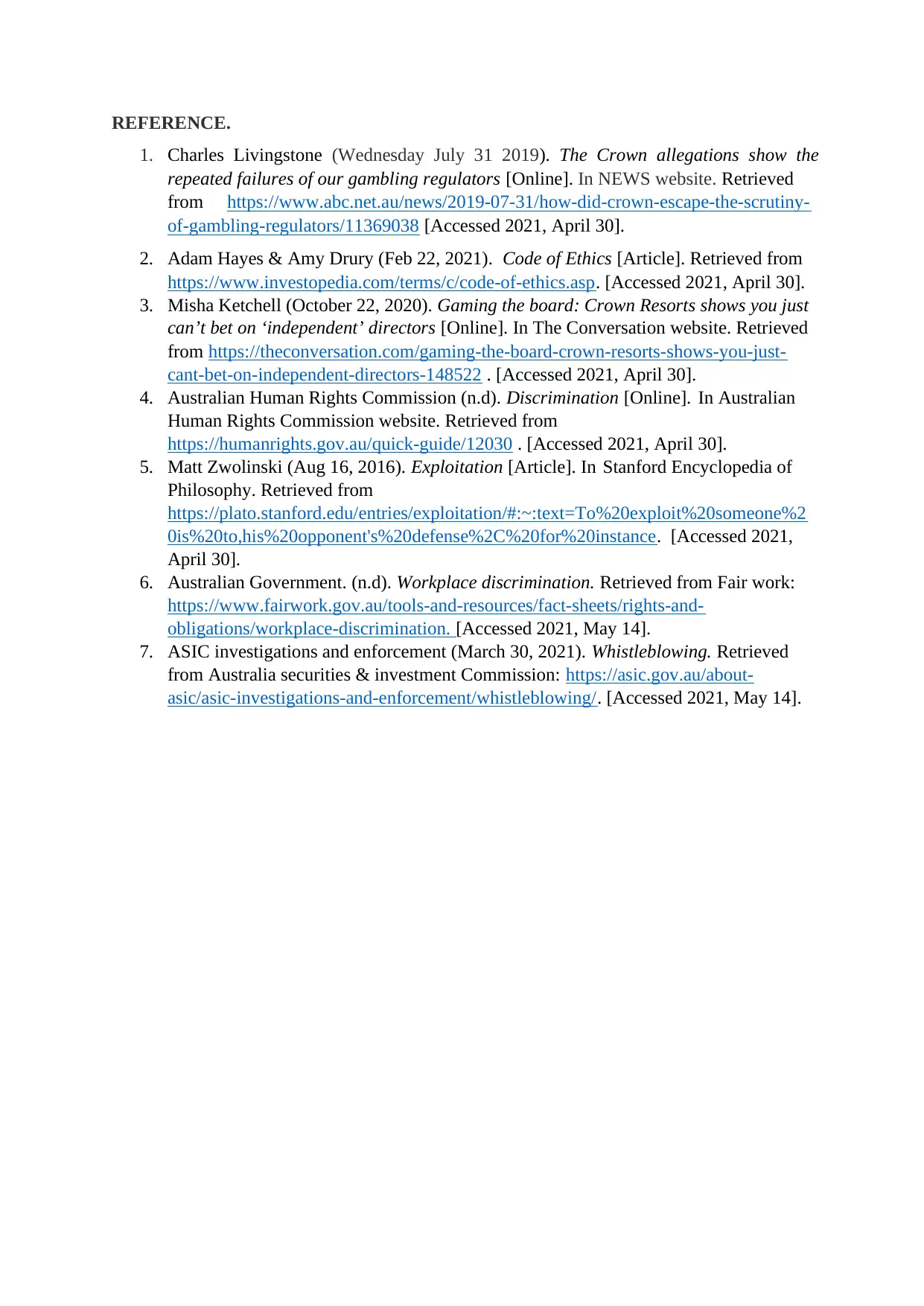
REFERENCE.
1. Charles Livingstone (Wednesday July 31 2019). The Crown allegations show the
repeated failures of our gambling regulators [Online]. In NEWS website. Retrieved
from https://www.abc.net.au/news/2019-07-31/how-did-crown-escape-the-scrutiny-
of-gambling-regulators/11369038 [Accessed 2021, April 30].
2. Adam Hayes & Amy Drury (Feb 22, 2021). Code of Ethics [Article]. Retrieved from
https://www.investopedia.com/terms/c/code-of-ethics.asp. [Accessed 2021, April 30].
3. Misha Ketchell (October 22, 2020). Gaming the board: Crown Resorts shows you just
can’t bet on ‘independent’ directors [Online]. In The Conversation website. Retrieved
from https://theconversation.com/gaming-the-board-crown-resorts-shows-you-just-
cant-bet-on-independent-directors-148522 . [Accessed 2021, April 30].
4. Australian Human Rights Commission (n.d). Discrimination [Online]. In Australian
Human Rights Commission website. Retrieved from
https://humanrights.gov.au/quick-guide/12030 . [Accessed 2021, April 30].
5. Matt Zwolinski (Aug 16, 2016). Exploitation [Article]. In Stanford Encyclopedia of
Philosophy. Retrieved from
https://plato.stanford.edu/entries/exploitation/#:~:text=To%20exploit%20someone%2
0is%20to,his%20opponent's%20defense%2C%20for%20instance. [Accessed 2021,
April 30].
6. Australian Government. (n.d). Workplace discrimination. Retrieved from Fair work:
https://www.fairwork.gov.au/tools-and-resources/fact-sheets/rights-and-
obligations/workplace-discrimination. [Accessed 2021, May 14].
7. ASIC investigations and enforcement (March 30, 2021). Whistleblowing. Retrieved
from Australia securities & investment Commission: https://asic.gov.au/about-
asic/asic-investigations-and-enforcement/whistleblowing/. [Accessed 2021, May 14].
1. Charles Livingstone (Wednesday July 31 2019). The Crown allegations show the
repeated failures of our gambling regulators [Online]. In NEWS website. Retrieved
from https://www.abc.net.au/news/2019-07-31/how-did-crown-escape-the-scrutiny-
of-gambling-regulators/11369038 [Accessed 2021, April 30].
2. Adam Hayes & Amy Drury (Feb 22, 2021). Code of Ethics [Article]. Retrieved from
https://www.investopedia.com/terms/c/code-of-ethics.asp. [Accessed 2021, April 30].
3. Misha Ketchell (October 22, 2020). Gaming the board: Crown Resorts shows you just
can’t bet on ‘independent’ directors [Online]. In The Conversation website. Retrieved
from https://theconversation.com/gaming-the-board-crown-resorts-shows-you-just-
cant-bet-on-independent-directors-148522 . [Accessed 2021, April 30].
4. Australian Human Rights Commission (n.d). Discrimination [Online]. In Australian
Human Rights Commission website. Retrieved from
https://humanrights.gov.au/quick-guide/12030 . [Accessed 2021, April 30].
5. Matt Zwolinski (Aug 16, 2016). Exploitation [Article]. In Stanford Encyclopedia of
Philosophy. Retrieved from
https://plato.stanford.edu/entries/exploitation/#:~:text=To%20exploit%20someone%2
0is%20to,his%20opponent's%20defense%2C%20for%20instance. [Accessed 2021,
April 30].
6. Australian Government. (n.d). Workplace discrimination. Retrieved from Fair work:
https://www.fairwork.gov.au/tools-and-resources/fact-sheets/rights-and-
obligations/workplace-discrimination. [Accessed 2021, May 14].
7. ASIC investigations and enforcement (March 30, 2021). Whistleblowing. Retrieved
from Australia securities & investment Commission: https://asic.gov.au/about-
asic/asic-investigations-and-enforcement/whistleblowing/. [Accessed 2021, May 14].
⊘ This is a preview!⊘
Do you want full access?
Subscribe today to unlock all pages.

Trusted by 1+ million students worldwide
1 out of 6
Related Documents
Your All-in-One AI-Powered Toolkit for Academic Success.
+13062052269
info@desklib.com
Available 24*7 on WhatsApp / Email
![[object Object]](/_next/static/media/star-bottom.7253800d.svg)
Unlock your academic potential
Copyright © 2020–2025 A2Z Services. All Rights Reserved. Developed and managed by ZUCOL.




